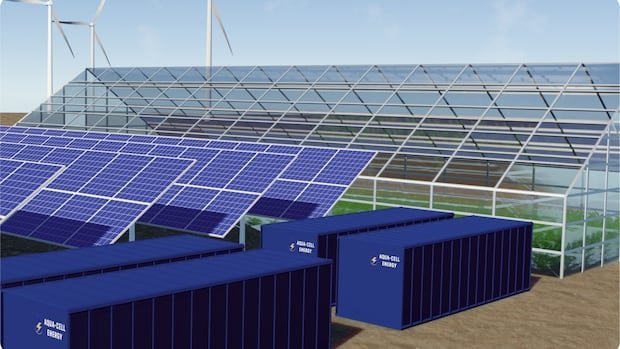An innovative startup from Edmonton is set to test groundbreaking battery technology in Medicine Hat, aiming to offer a cost-effective alternative to upgrading the electrical grid. Aqua-Cell Energy’s saltwater flow battery, housed in a shipping container, has been selected as one of the winners of Medicine Hat’s innovation competition and will undergo a pilot project in early 2026.
According to Aqua-Cell Energy’s CEO Keith Cleland, grid batteries function akin to a vehicle’s engine components, where the power output or runtime can be optimized by adjusting the size of the battery stack. Cleland, originally from Calgary, delved into saltwater battery research during his undergraduate studies at the University of Waterloo. He later co-founded Aqua-Cell Energy with his current Chief Technical Officer Ellsworth Bell through the university’s startup incubator Velocity.
Collaborating with the Northern Alberta Institute of Technology upon returning to Alberta, Cleland refined and tested his research. Now, as he prepares to evaluate the battery’s performance on a larger scale, Cleland envisions contributing to Alberta’s energy landscape by introducing clean energy technology to fortify the electric grids.
The City of Medicine Hat initiated the Energy Innovation Challenge to facilitate the transition to clean energy and diversify Alberta’s energy sector. The program, with a budget of $2.4 million, supports half of six pilot projects over three years, backed by various organizations including Prairies Economic Development Canada, Decentralized Energy Canada, and Emissions Reduction Alberta.
Medicine Hat stands out as the only city in Canada with autonomous energy production and distribution, operating a micro-grid independent of the provincial power grid. This unique setup makes it an ideal test site for Aqua-Cell’s saltwater battery pilot, as highlighted by Raymond Chokelal, a senior electrical engineer with the city.
The potential benefits of Aqua-Cell’s saltwater battery extend to addressing Medicine Hat’s financial challenges in its energy sector, marked by aging infrastructure and escalating maintenance costs. By leveraging innovative solutions like the saltwater battery, the city aims to mitigate expenses and enhance grid efficiency, as explained by Chokelal.
Looking ahead, Anouk Kendall, President of Decentralized Energy Canada, emphasized the importance of supporting entrepreneurs like Cleland and Bell to bolster the resilience of Canada’s energy infrastructure. Aqua-Cell’s saltwater battery aligns with Medicine Hat’s renewable energy goals, offering stable power supply and cost-effectiveness for electricity users.
The deployment of Aqua-Cell’s pilot battery on Medicine Hat’s grid in early 2026 signifies a step towards a sustainable and efficient energy future for the city.

